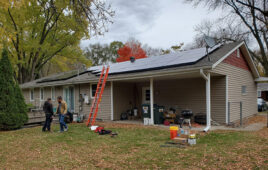A new report documents the devastating climate impacts if 12 new frack gas projects in New Jersey move forward with one completed in 2018, in stark contrast to Governor Murphy’s stated commitment and legal requirements to combat global warming and reduce greenhouse gas emissions.
The report, “FIGHTING Climate Change in NJ: The Urgent Case for a Moratorium on all Fossil Fuel Projects” authored by the Empower NJ: No Fossil Fuel Projects campaign, calculates the previously overlooked cumulative greenhouse gas emissions (GHG) from these 13 projects (see Appendices I and II for details of each project) would increase New Jersey’s total GHG emissions by approximately 30% and the five power plants would spike GHG emissions from electricity generation by roughly 76%.
The report makes a powerful case for a moratorium on new fossil fuel infrastructure until New Jersey has rules and standards in place to achieve New Jersey’s 100% clean energy goals and comply with existing law and stated Murphy Administration policy. It describes the major actions needed during the moratorium and provides an analysis of the key economic factors involved in effectively transitioning to a green economy.
State legislators fighting against climate change and local mayors on the front lines of these projections joined Empower NJ: No Fossil Fuel Projects, a growing coalition of over 58 progressive, faith, environmental and citizen groups (see Appendix III of the report for a full list of members) calling on Governor Murphy to initiate the moratorium, in releasing the report.
“This report comes out at a critical time. The choices we make today — to continue to guzzle fossil fuels, or to build a sustainable society powered by renewable energy — will affect not just our lives, but our children’s and grandchildren’s lives. There is no excuse for inaction, and no reason to build new fossil fuel plants,” said Senate Majority Leader Loretta Weinberg (D-37), a leading opponent of the Meadowlands gas plant.
Assemblyman John McKeon (D-27) added: “We can’t afford the increased greenhouse gas emissions from these fossil fuel projects. A moratorium until protections are in place would ensure we meet our obligations under the Global Warming Response Act, Paris Climate Accords and the US Climate Alliance, and are on track to achieve Governor Murphy’s commitment to be 100% clean energy by 2050. At minimum, we need to regulate greenhouse gasses under the Clean Air Act, strengthen water rules weakened by the Christie Administration, and close loopholes that let polluters in New Jersey buy their way out of cleaning up deadly ozone.”
Major findings of the report include:
- A 32% increase (32 million metric tons [MMt]/year) in total NJ CO2e GHG (CO2 and methane) emissions over current levels from the 13 projects. With methane being 86 times more efficient at trapping heat than CO2 over a 20-year time frame, GHG emissions from fracked natural gas are greater than those from coal.
- A 76% increase (14.2 MMt/year) in CO2e GHG emissions from in-state power plants over 2017 levels by the 5 power plants (Sewaren 7 now operating under 2018 approvals).
- Spiking GHG emissions make it impossible to meet the clean renewable energy objectives of the Murphy Administration and the state’s obligations under existing law despite advances on offshore wind, battery storage, etc.
- Demonstrated lack of need for 12 of the projects to residents and businesses in New Jersey as any true increase in energy demand can be met with improvements in energy efficiency, conservation and clean renewable energy developments. Two of the projects would not even deliver any energy to state residents.
- Significant increases in already unhealthy levels of ground level ozone and other toxic air pollutants leading to more premature deaths and increased health care costs.
- Investing in renewable energy and clean renewables will create more jobs than investing in new fossil fuel projects.
“It’s kind of scary that no one until now has done the basic math around these cumulative impacts or shared it,” stated Ken Dolsky of the Don’t Gas the Meadowlands Coalition and a primary author of the report. “Our research shows building these gas projects would make it impossible to achieve Governor Murphy’s objectives in EO 28 and what the Global Warming Response Act requires. We also document that the need in New Jersey for these new projects is either non-existent or very soft. That is why we are calling for a moratorium to give the state the time it needs to get its act together.”
“New Jersey is the most densely populated state so we have to be a leader when it comes to protecting clean air and water,” Senator Bateman (R-16) said. “Climate change is real and unless we take action now, our kids and our grandkids won’t have access to these resources in the future. Dangerous projects like the PennEast Pipeline must be stopped and we must permanently ban fracking in the Delaware River Basin. I am proud to be a part of this fight. We have made a lot of progress, but there is so much more to do and we need a moratorium to get there.”
Specific steps the report calls for during the moratorium include but are not limited to:
- Establishing rules under existing air pollution laws to limit GHG emissions and enable DEP to reject permits for projects that would cause New Jersey to exceed GHG limits;
- Reversing Governor Christie’s rollbacks of water and land use regulations that make it easier to build pipelines in environmentally sensitive areas
- Eliminating the ability to increase ozone levels by allowing the purchase of ozone credits in any area out of compliance with EPA standards;
- Championing a full ban on fracking and all of its associated activities throughout the Delaware River Basin and in New Jersey; and
- Creating a strong green jobs program including training and placement in the new green economy, built on and driving living wage union jobs in emerging sectors (solar, offshore wind, electric car infrastructure, efficiency, etc.).
“Climate change is creating real, devastating effects and New Jersey is experiencing it firsthand. Areas are flooding at higher rates than ever before, causing distress amongst homeowners who face rising insurance rates and high costs to elevate their structures. The time to act is now, by eliminating new fossil fuel projects we can take the first of many steps to protect our environment and ensure that our beautiful Garden State is protected for future generations,” continued Assemblywoman Valerie Vainieri Huttle (D-37).
“The Roseland Compressor station is a cause of tremendous concern to my constituents, and plans to build a second station have compounded the worry, especially given its proximity to a power transfer station and protected wetlands. The Roseland project is one of the 13 pipelines, power plants and compressor station projects in the report. While individually quite concerning, their cumulative impact (a 32% increase in greenhouse gas emissions) is even more so. I stand squarely with the Empower NJ coalition in calling for a moratorium on all of these projects until such time as proper protections are in place to ensure compliance with the 80% decrease in greenhouse gas emissions mandate of the 2007 Global Warming Response Act and Governor Murphy’s goal of an of 100% clean energy,” concluded Assemblywoman Mila Jasey (D-27).
Read a Statement by Amy Goldsmith, NJ State Director of Clean Water Action
News item from Empower NJ- No Fossil Fuel Projects Campaign.





Tell Us What You Think!